|
|
|
Sort Order |
|
|
|
Items / Page
|
|
|
|
|
|
|
| Srl | Item |
| 1 |
ID:
117196
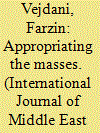

|
|
|
|
|
| Publication |
2012.
|
| Summary/Abstract |
This paper traces the emergence of folklore studies and ethnography in interwar Iran. It argues that these disciplines were part of larger nationalist projects of representing and speaking for the "masses." The first part of the paper explores how and why a number of Iranian intellectuals engaged in folklore studies after a period of prolonged political activism in the first few decades of the 20th century. The second part of the paper examines cultural institutions established by the state, mainly in the late 1930s, in an attempt to appropriate and institutionalize folklore studies and ethnography for the purposes of nation building. These efforts were fraught with ambivalences because the "masses" were simultaneously praised as repositories of "authenticity" and looked down upon as a potential source of "backwardness."
|
|
|
|
|
|
|
|
|
|
|
|
|
|
|
|
| 2 |
ID:
077208
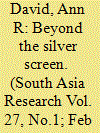

|
|
|
|
|
| Publication |
2007.
|
| Summary/Abstract |
This article first highlights the relative paucity of literature on South Asian dance and provides a brief overview of existing material. It then examines particularly the influence of filmi or Bollywood dance on South Asian dance practices in the UK. It locates film dance within the Bollywood genre, noting its recent acceptance as a new form of popular culture and its attractions for the younger generation of British Asians. The place of dance in Hindi films is analysed and discussed briefly to con-textualise the relationship between such film dances and South Asian dance practices in Britain. Using evidence from fieldwork gathered in Leicester and London amongst dance teachers and students of South Asian dance, the article questions notions of identity, authenticity, tradition and the changing nature of dance transmission as Bollywood forms grow in popularity.
|
|
|
|
|
|
|
|
|
|
|
|
|
|
|
|
| 3 |
ID:
154471
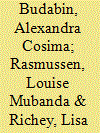

|
|
|
|
|
| Summary/Abstract |
The past decade has seen a frontier open up in international development engagement with the entrance of new actors such as celebrity-led organisations. We explore how such organisations earn legitimacy with a focus on Madonna’s Raising Malawi and Ben Affleck’s Eastern Congo Initiative. The study draws from organisational materials, interviews, mainstream news coverage, and the texts of the celebrities themselves to investigate the construction of authenticity, credibility, and accountability. We find these organisations earn legitimacy and flourish rapidly amid supportive elite networks for funding, endorsements, and expertise. We argue that the ways in which celebrity-led organisations establish themselves as legitimate development actors illustrate broader dynamics of the machinery of development.
|
|
|
|
|
|
|
|
|
|
|
|
|
|
|
|
| 4 |
ID:
152311
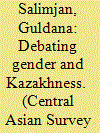

|
|
|
|
|
| Summary/Abstract |
Aytis is a central component of Kazakh oral literature. It is a duelling performance of improvised oral poetry between two aqins (poets, or bards) accompanying themselves on the dombra, a two-stringed plucked instrument. This article analyses contending issues in a transnational aytis between Chinese and Kazakhstani aqins, and explores how gender plays into the complex interplay of transnational identity politics, nationalism, performer positionality, and the preservation of intangible cultural heritage. This article argues that, though minority actors are subject to state-patronized national projects and the gender paradigms those projects entail, they can also obtain empowerment from performing tradition as a way to legitimize their status as culture producers and flexible citizens. Situated as the guardians of a constructed gender balance in society, women performers of oral tradition occasionally find themselves with opportunities to transgress the boundaries of their national and gender norms.
|
|
|
|
|
|
|
|
|
|
|
|
|
|
|
|
| 5 |
ID:
181903
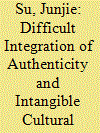

|
|
|
|
|
| Summary/Abstract |
Authenticity is a concept that is not seen in UNESCO’s Intangible Cultural Heritage (ICH) discourse but is emphasised in Chinese ICH official discourse. An analysis of the origins, discourses, and practices of the notion of authenticity of ICH, as well as the difficulties generated from this concept, illustrates the creation of ICH in China, which mediates between local and international ideologies. This paper adopts historical and critical heritage discourse perspectives to examine cases in Yunnan Province, China, including the understandings, discourses, and practices of the idea of “authenticity” and related original ecology in regard to experts, officials, and ICH practitioners. Through the lens of authenticity, the paper illustrates the history of the complicated relationships between authenticity and ICH in the last 20 years, revealing the dynamism and difficulties in the integration of authenticity and ICH as an official discourse, and the possibilities and restrictions of reconceptualising authenticity in the current contexts of integrating culture and tourism, as well as the reform of cultural governance, in contemporary China.
|
|
|
|
|
|
|
|
|
|
|
|
|
|
|
|
| 6 |
ID:
107223


|
|
|
|
|
| Publication |
2011.
|
| Summary/Abstract |
This paper examines perceptions of the state by urban Muslim artisans in India. Through ethnographic analysis, I focus on the life and work trajectories of two artisans whose perceptions and experiences of the state differ widely. The common thread running through each artisan's experience is that their engagement or disengagement with the state produces subjectivities that are both deemed authentic. One artisan's involvement with the state serves to authenticate not only her skills and craftsmanship but also her sense of self, while another artisan's refusal to engage with the state authenticates his work and sense of self because of his experience of the state as corrupt. I am particularly interested in how state-issued documents, such as the certificate conferred to winners of the national awards for highly skilled artisans and the artisan identification card, are perceived as legitimate or illegitimate based on ideals of what it means to be an authentic artisan. This paper also examines how conceptualizations of the margins through the medium of documents can provide alternate ways of understanding experiences of the state.
|
|
|
|
|
|
|
|
|
|
|
|
|
|
|
|
| 7 |
ID:
107224


|
|
|
|
|
| Publication |
2011.
|
| Summary/Abstract |
This paper examines perceptions of the state by urban Muslim artisans in India. Through ethnographic analysis, I focus on the life and work trajectories of two artisans whose perceptions and experiences of the state differ widely. The common thread running through each artisan's experience is that their engagement or disengagement with the state produces subjectivities that are both deemed authentic. One artisan's involvement with the state serves to authenticate not only her skills and craftsmanship but also her sense of self, while another artisan's refusal to engage with the state authenticates his work and sense of self because of his experience of the state as corrupt. I am particularly interested in how state-issued documents, such as the certificate conferred to winners of the national awards for highly skilled artisans and the artisan identification card, are perceived as legitimate or illegitimate based on ideals of what it means to be an authentic artisan. This paper also examines how conceptualizations of the margins through the medium of documents can provide alternate ways of understanding experiences of the state.
|
|
|
|
|
|
|
|
|
|
|
|
|
|
|
|
| 8 |
ID:
111520
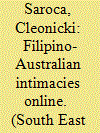

|
|
|
|
|
| Publication |
2012.
|
| Summary/Abstract |
Internet relationships, particularly those involving 'Asian' women and 'Western' men, are typically depicted as problematic. This article explores online intimacy between Filipino women and non-Filipino Australian men. It seeks to extend our awareness of the different ways intimacy is understood, measured and materialized online. In exploring how intimacy takes place online and is interpreted by people who may have different emotional repertoires and expectations about what constitutes intimacy, love and romance, the article engages with authenticity, gender performance and the development online of cathexis - trust, intimacy and love - across national and cultural boundaries and offline. In the process, it challenges popular myths about Filipino women, their non-Filipino partners and online relationships in general. The paper is based on ethnographic fieldwork which entailed interviews and participant observation in the Philippines and Australia and on the Internet with Filipino-Australian couples who met each other through some form of Internet technology. It also draws on the author's ethnographic research on Kasal, an online moderated forum that explores 'Fil-West' relationships. She highlights how participants use the Internet for relationship negotiation in ways that are meaningful to them.
|
|
|
|
|
|
|
|
|
|
|
|
|
|
|
|
| 9 |
ID:
097542
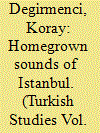

|
|
|
| 10 |
ID:
077258
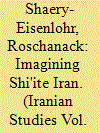

|
|
|
| 11 |
ID:
120789


|
|
|
|
|
| Publication |
2013.
|
| Summary/Abstract |
In many ways, the structural violence of settler colonialism continues to dominate the lived experience of Indigenous populations, including Aboriginal and Torres Strait Islander peoples in contemporary Australia. One aspect of this structural violence concerns the regulation of Indigenous identity, today perpetuated through state monitoring of the 'authenticity' of Aboriginal people. This article argues that the contest over Indigenous identity perpetuates a form of symbolic political violence against Indigenous people. It considers the ways in which structural violence against Indigenous identity has featured in Australia's settler colonial regime and examines the particular violence faced by urban-dwelling Aboriginal people, who endure much contemporary scrutiny of the 'authenticity' of their Indigeneity. As a case study, the article examines the symbolic violence associated with a particular legal case in Australia and, in light of this analysis, concludes that settler colonies could make a decolonising gesture by legislating for the protection of Indigenous identity.
|
|
|
|
|
|
|
|
|
|
|
|
|
|
|
|
| 12 |
ID:
120359
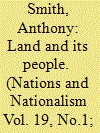

|
|
|
|
|
| Publication |
2013.
|
| Summary/Abstract |
From the late eighteenth century onwards, increasing numbers of visual artists came to identify with their nations and with the homeland and its people. This development was strongly influenced by growing national cultural support and regulation of the arts by academies, art schools, museums and art markets in Western Europe. On a subjective level, the Rousseauan movement of a 'return to Nature', Herder's espousal of vernacular cultural self-expression and, above all, the widespread Romantic cult of authenticity, were potent influences on the inner self-identification of visual artists after 1800, and were manifested in the novel importance accorded to landscape and rural genre painting in Western Europe. Here I consider the role of national sentiment, the 'return to Nature' and the cult of authenticity, first in landscape paintings by Paul Sandby, J. M. W. Turner and John Constable in early nineteenth-century Britain, and then in the rural genre paintings of Jean-Francois Millet and Jules Breton in nineteenth-century France and Josef Israels, Anton Mauve and Vincent Van Gogh in the later nineteenth-century Netherlands. Their work reveals how nineteenth-century visual artists became inwardly identified with the 'land and its people', and how they in turn contributed, especially through prints and engravings, to the dissemination of national imagery and a cultural nationalism.
|
|
|
|
|
|
|
|
|
|
|
|
|
|
|
|
| 13 |
ID:
096574
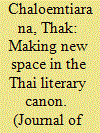

|
|
|
|
|
| Publication |
2009.
|
| Summary/Abstract |
The Thai literary canon identifies three novels published around 1929 as the first authentic Thai novels. This pronouncement elides the importance of novels published before that date. Because literary scholars focus their teaching, writing and research on novels defined by the canon, lesser-known works have been overlooked or ignored. The current Thai canon obfuscates literary transmission, in particular, the significance of pre-1929 compositions. In this essay, three novels - Mae Wan's Khwam phayabat (1902), Khru Liam's Khwam mai phayabat (1915) and Nang neramid (1916) - are selected to show that these early compositions represent important genres of novels that should be considered for the canon, even though they are seen as less than 'authentic' Thai. This paper examines the three novels through the lens of critical, translation and postcolonial theories. It is a study of vernacularisation, authenticity, hybridity, mimesis, and bi-culturalism.
|
|
|
|
|
|
|
|
|
|
|
|
|
|
|
|
| 14 |
ID:
178893
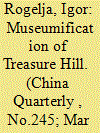

|
|
|
|
|
| Summary/Abstract |
This article discusses the “museumification” of an urban village in Taipei into the Treasure Hill Artist Village in the context of wider debates on gentrification and the redevelopment of marginal urban spaces. Populated by soldiers evacuated to Taiwan following the Chinese Civil War, Treasure Hill became a hybrid space, combining welfare provision for elderly veterans with an artist colony, forming part of the Taipei Cultural Foundation. Lauded as a compromise that combined social, cultural and economic aspects of urban regeneration, the mix of high-modernist paternalism and neoliberal place-making resulted in the integration of the space into the existing city bureaucracy as a museum-like institution, with elderly residents and artists becoming exhibits in a living diorama. Although widely understood as “gentrification” at the time, the article argues that the museumification of Treasure Hill was a process led by a coalition of state and spatial experts which has distinct implications for the study of state-led neighbourhood amelioration.
|
|
|
|
|
|
|
|
|
|
|
|
|
|
|
|
| 15 |
ID:
190957
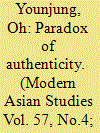

|
|
|
|
|
| Summary/Abstract |
Mitsukoshi, a famed Japanese department store, opened a Korean Product Showroom in its Keijō (Seoul) branch in 1930. The Korean Product Showroom was the only space decorated in ‘Korean style’ within the Keijō Mitsukoshi building, which was designed in Neo-Renaissance style, much like its flagship store in Tokyo. This showroom offered Korean artefacts as luxury souvenirs aimed at Japanese tourists. The most popular items sold in the showroom were Koryŏ-style celadon ware and lacquerware inlaid with mother-of-pearl, which Mitsukoshi ordered from local workshops in Korea. Interestingly, the workshops were run by Japanese entrepreneurs and sometimes even employed Japanese artisans. This article examines the inauthentic authenticity of ‘Korean style’ and ‘Korean products’ that the Japanese produced and consumed in colonial Korea. It does not imply that only Koreans are entitled to represent Korean culture. There have been many studies asserting that Korean culture was destroyed and distorted from its ‘original’ forms by Japan’s cultural genocide during the colonial period. This article neither is interested in repeating such criticism nor focuses on recuperating genuine Koreanness. Rather, it explores why the Japanese desired ‘pure Korea’ and how that desire shaped ‘Korean style’ and ‘Korean products’ through Keijō Mitsukoshi’s Korean Product Showroom and its products.
|
|
|
|
|
|
|
|
|
|
|
|
|
|
|
|
| 16 |
ID:
130793
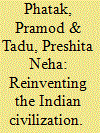

|
|
|
|
|
| Publication |
2014.
|
| Summary/Abstract |
"1 have travelled across the length and breadth of India and I have not seen one person who is a beggar, who is a thief Such wealth I have seen in this country, such high moral values, people of such calibre, that I do not think we would ever conquer this country, unless we break the very backbone of this nation, which is her spiritual and cultural 'heritage, and, therefore, I propose that we replace her old and ancient education system, her culture, for if the Indians think that all that is foreign and English is good and greater than their own, they will lose their self-esteem, their native self culture and they will become what we want them, a truly dominated nation. "
These words have been attributed to Macaulay's address to the British Parliament on 2"" February, 1835.
Though the authenticity is, of late, being questioned by certain quarters the detractors have yet not succeeded in convincingly proving their point and hence we take the above quoted words at face values. Needless to say that they speak volumes about the kind of society that India was.l For all those people who may still not believe this largely historical truth that India was a culturally rich and prosperous society, we would like to quote below Robert Clive's views about the city of Murshidabad presently in West Bengal which says that 'Murshidabad is a city of extensive, populous and rich as the city of London, with this difference, that there are individuals in the first possessing in?nitely greater property than in the last.
|
|
|
|
|
|
|
|
|
|
|
|
|
|
|
|
| 17 |
ID:
155056
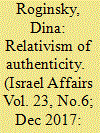

|
|
|
|
|
| Summary/Abstract |
Relying on historic and ethnographic fieldwork, this article traces the development of the Israeli folk dance movement in Israel and the United States over the last century. Israeli folk dances are consumed worldwide and especially by American Jewry precisely because they are perceived as an authentic expression of national Israeli culture, even as their authenticity is continuously contested and re-evaluated in different historical and cultural contexts and by various actors who engage in their preservation and re-creation. The result is an intricate articulation of an ideological and rhetorical debate on authenticity, which reveals its relativistic character and sheds light on the cultural negotiation of identity between Israeli and American Jewry.
|
|
|
|
|
|
|
|
|
|
|
|
|
|
|
|
| 18 |
ID:
084899
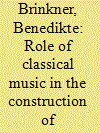

|
|
|
|
|
| Publication |
2008.
|
| Summary/Abstract |
Very little research has been conducted into the relationship between classical music and nationalism. This is a shame as music has played a significant role in the construction and consolidation of nationalism in many European countries. This article illustrates this by analysing the role of classical music and, in particular, contemporary serious music in the construction of Danish consensus nationalism in the 1930s and 1940s. In so doing, it explores the repression of the modernist expression which was and still is considered a Continental European phenomenon in favour of a local and traditional expression. Furthermore, it analyses the elevation of Carl Nielsen to the position of Danish composer par excellence.
|
|
|
|
|
|
|
|
|
|
|
|
|
|
|
|
| 19 |
ID:
187167
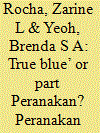

|
|
|
|
|
| Summary/Abstract |
While no longer associated with colonial economic and political privilege, Peranakan Chinese identity is now often viewed as an ‘authentic’ heritage in contemporary Singapore that is made visible through hybrid cultural and material markers. But for the Peranakan community, what does it mean to be authentically Peranakan in post-colonial Singapore? This paper explores concepts of hybridity and authenticity for Peranakan individuals, highlighting how being Peranakan is informed by ideas of belonging, mixedness and purity, from being ‘true blue’ to generational shifts towards being part Peranakan. Drawing on critical mixed race theory, the paper provides an historical overview of Peranakan identity in the region, tracing how ‘authentic’ Peranakan-ness has changed over time. Using a series of narrative interviews with self-identified Peranakan individuals across three generations, the paper explores public and private representations of identity, and how mixedness and purity are seen as being ‘authentic’ aspects of Peranakan culture.
|
|
|
|
|
|
|
|
|
|
|
|
|
|
|
|
| 20 |
ID:
177585
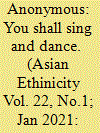

|
|
|
|
|
| Summary/Abstract |
This article examines the politics of China’s Intangible Cultural Heritage (ICH) policy and practice in Xinjiang through a study of the profound transformation of three interlinked Uyghur oral traditions ostensibly safeguarded as UNESCO or national-level cultural heritages: muqam, mäshräp and dastan. Based on fieldwork in Xinjiang and among the Uyghur diaspora, it shows how an intensive process of social reengineering, taking place in the nexus of contested state ICH policies and its ‘War on Terror,’ has transformed complex religio-cultural traditions into simplified and exoticized patriotic ‘song and dance’ performances. While the state defines these staged versions as ‘authentic’ heritage that should not be deviated from, community elders and cultural practitioners see them as ‘fake’; they violate community values and disembed fluid oral traditions from everyday life, which is where they are reproduced and generationally transmitted. The rhetoric of ‘safeguarding’ thus represents a disavowal of its actual effects and the severe restrictions on spaces available for cultural practice in Xinjiang.
|
|
|
|
|
|
|
|
|
|
|
|
|
|
|
|
|
|
|
|
|